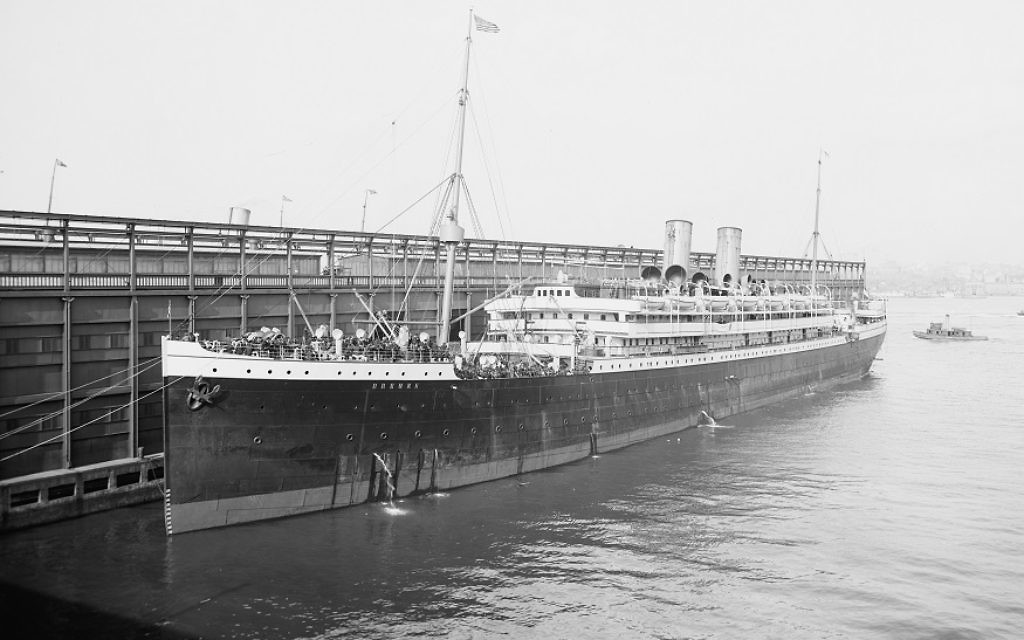Blessing the Memory of Immigrant Forebears
The chains of Jewish family history link us to the stories of today's American newcomers.
Fannie Greenzeig was a tough cookie.
As a 12-year-old in the spring of 1905, she hid with her father, Solomon, under a load of hay while Polish troops stabbed at the pile with pitchforks before allowing the wagon to cross into Germany.
Her mother, Dora, and her younger sister, Alice, remained in Poland (then part of the Russian Empire).
Get The AJT Newsletter by email and never miss our top stories Free Sign Up
Solomon had just enough money to book passage in steerage — nine days in the bowels of the steamship SS Bremen — from Germany to America, where presumably better times awaited.
As the lowest class of passengers, Solomon and Fannie were ferried from the dock at Hoboken, N.J., to Ellis Island, where, in view of the Statue of Liberty, they were sprayed with disinfectant, inspected for diseases, particularly of the eyes, and questioned by immigration agents.
Arriving in New York in early April, too late to enroll in school, Fannie went to work in a shop owned by relatives that produced hairpieces. After three months, she was paid $3 a week. She never resumed a formal education.
When Dora and Alice emigrated in 1907, the reunited family lived not among the Jewish masses in the Lower East Side of Manhattan (though Fannie thought the movie “Hester Street” did a good job depicting that life), but in apartments farther uptown.
Fannie cut hair for several decades, in beauty shops but also in the homes of some of the wealthiest women in New York (an experience that left her with no desire to watch the British drama “Upstairs, Downstairs”).
She enjoyed drinking scotch and liked a good liverwurst or smoked fish. She smoked cigarettes for 65 years, until she was 80, when a longtime friend’s admonishment put an end to that habit, and she lived another decade after that.
Fannie was the kind of woman who took no guff from anybody.
I loved her, but my great-aunt scared me a little, too. She appeared as sturdy as Alice, my paternal grandmother, seemed frail.
My father was 11 years old when his father died. Fannie helped raise him, and my father greatly respected the sacrifices she made.
We called her Fayi, as my father had since childhood, when he could not pronounce “Fannie.”
Not until her late 70s did she stop cutting our hair during visits to our home in suburban Chicago.
Her voice is embedded in my memory, but I also have a tape of an interview she did at age 86, with my father and my youngest brother, when she lived in a home for the Jewish aged in the Bronx.
My search for that cassette was prompted by derisive references to chain migration in the immigration policy debate. Heightened interest among Jews in how their families came to the United States has been a benefit of this fractious discourse.
Fannie spoke fondly of her childhood in Poland, where she was a “country kid” who enjoyed fishing and going to school (in a one-room schoolhouse, where the teacher asked students to warn her if troops or police came so that she could throw her notebook of revolutionary writings into the stove).
As for coming to New York and going to work, “Well, it wasn’t too good,” Fannie said matter-of-factly. “After all, I was young.”
I also reread the transcript of interviews that my wife conducted with her paternal grandmother, Rose (“Call me Sugie”), who arrived in Chicago in February 1922 after emigrating (in steerage) with her parents as a 9-year-old from the Ukrainian village of Narodychi.
Like Fannie, Rose went to work early — after school at age 13, in a mattress plant opened by her father, and after graduating high school, for a corset company. In time, Rose, her husband and their son (my father-in-law) grew that family mattress business.
They never met, but I imagine that Fayi and Sugie would have had quite the conversation about their immigrant experiences and the foundations that they helped build for our lives today.





comments